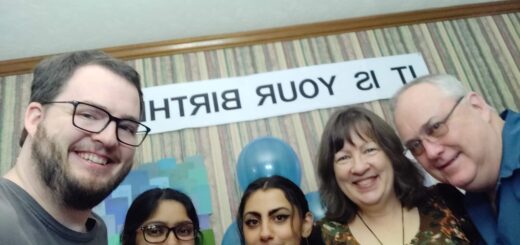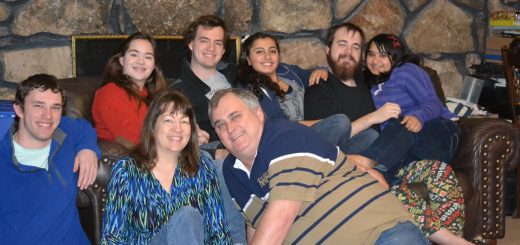A Biblical Community
“A Biblical Community” – March 17th, 2024 (John 5:36b-40)
In early childhood, Mom read many stories aloud to my siblings and me. I especially looked forward to hearing Grimm’s Fairy Tales and Aesop’s Fables. My imagination was ignited with images of straw being spun into gold, hair being flung out of a high window, and a shepherd boy crying “Wolf! Wolf!” Maybe I didn’t listen too carefully to the cautionary parts of these stories because I really hoped I’d find a house in the forest made from candy.
In middle childhood, I was fascinated by “Timeslip,” a TV show that brilliantly blended science with fantasy in its tale of two teenagers who discover the “Time Barrier,” a strange anomaly in a field at a disused military base. This Time Barrier enabled them to travel in time, to visit the past as well as alternative futures. Each episode showed them passing through an invisible hole in an invisible fence into another place in space and time. Along with many other time travel wannabes, I idealistically hoped I could find such an entrance into the past or the future for myself.
As a teenager, I was captivated by the Little House on the Prairie stories, both the books and the TV series. The characters, scenarios, and locations appealed to me with their emphasis on family, adventure, and resilience, even more appealing because they also tackled troublesome topics. I imagined and role-played what I would do if I were faced with inhospitable weather, intolerant neighbors, unsuccessful crops, or unwelcome strangers. I already realized by then that the people who loved and cared for others the best were usually the ones who had courageously faced and stood firm in whatever circumstances came their way. I sincerely hoped I would get the chance to serve God by going to difficult places and being willing to do hard things.
There are all kinds of stories in the world. Some, like Fairy Tales and Fables, are completely fictitious, often relying on anthropomorphism to teach us deep truths about life, ourselves, or the world around us. Some stories have a component of reality to them but invite us to ignite our imaginations to help us to explore the unknown. Yet other stories introduce us to real people who lived in other times and places and whose lives inspire us to lean towards virtue and away from vice. It’s important to choose carefully which stories we read and what hopes we nurture. What good would it do us to spend our lives looking for forests with candy houses or invisible fences with holes?
We are continuing our series on Vineyard Values today as we remember that we are “A Biblical Community.” We talk a lot around here about what Christian community looks like. Today we’re going to focus on the biblical aspect. The word “Bible” comes from the Latin biblia which means “books,” derived from the Greek name for an ancient port situated in modern Lebanon, Býblos, the place where papyrus was prepared and exported. Sometimes we Christians are known as “people of the book.” This book contains the sacred writings that we know as the Bible.
Does being biblical mean that we carry around a book (and hopefully not whack anyone on the head with it)? Does being biblical mean that we follow it as a set of life principles? Does being biblical mean that we obey every law and instruction? Does being biblical mean that we memorize Bible verses? There are more than 45,000 Christian denominations out there precisely because there are at least that many different understandings about what it means to be biblical!
Our text today comes from John 5:36b-40 (NRSV) – “36b The works that the Father has given me to complete, the very works that I am doing, testify on my behalf that the Father has sent me. 37 And the Father who sent me has himself testified on my behalf. You have never heard his voice or seen his form, 38 and you do not have his word abiding in you, because you do not believe him whom he has sent. 39 You search the scriptures because you think that in them you have eternal life; and it is they that testify on my behalf. 40 Yet you refuse to come to me to have life.”
Let’s start with a little context. If you’ve been tuning in to our Multimedia Lent Devotionals, you might remember seeing and hearing Jesus’ incredible encounter with a paralytic. This encounter from the beginning of John chapter 5 has gripped my heart in recent months as I’ve dived deeper into the story through some of my Lent reflections and seminary writings. Jesus chose to talk to and then heal a man who had been paralyzed for 38 years. This man was lying beside the Pool at Bethesda in Jerusalem, right near one of the entrances to the Temple. After Jesus miraculously healed him, the man promptly walked to the Jewish religious leaders so he could tell them who had made him well. These religious leaders were wholeheartedly devoted to reading and studying the scriptures. They weren’t too happy about what Jesus did, for this reason: Jesus violated the sabbath. Did they even notice that Jesus had just healed a guy who had not walked for 38 years? Then Jesus said something even worse, words that seemed to make their blood boil, “My Father is still working, and I also am working.” The religious leaders knew that God worked every day sustaining the universe. But by saying that, Jesus claimed, in essence, “my works are the works of God,” which they knew was the same as saying, “I am equal to God.” They were so offended by Jesus’ claim that they sought all the more to kill him.
Now let’s unpack today’s text a little more by looking at what a biblical community is not.
We don’t just search the written word.
The Jewish religious leaders considered Moses to be the author of the Torah, the inspired word of God. Jesus acknowledges in verse 39 that they searched the scriptures because they thought that in them, in God’s written word, they would have eternal life. Jesus then says something that shocked them to their core, “It is they that testify on my behalf.” Jesus’ pain is palpable as he looks with love on these well-meaning but misguided religious leaders and laments in verse 40, “You refuse to come to me to have life.” Jesus affirms that the searching these religious leaders were doing was good. But, in focusing on the messenger, they ended up missing the message! How Jesus’ heart must have broken over those who loved the scriptures so much and yet actually disobeyed those beloved scriptures in their rejection of him. God’s written word is a gift, yes, but there’s more to being a biblical community!
We don’t just stand by waiting for eternal life after we die.
When Jesus taught his disciples to pray, he told them to pray in this way, “Your kingdom come. Your will be done, on earth as it is in heaven” (Matthew 6:10). To pray for God’s kingdom to come is to remain alert and expectant for the future reign of God to break into the present as we partake of the words and the works of Jesus. The eternal life of which Jesus speaks encompasses both physical and spiritual existence. It operates simultaneously outside of time, inside of time, and beyond time. What we believe about the nature of eternal life greatly impacts how we will respond to the needs of the world around us. What we believe about when God’s kingdom will be made visible greatly impacts how we treat people and how we care for creation. What we believe about the already-but-not-yet of the kingdom of God greatly impacts how we proclaim and demonstrate the good news of the kingdom. Eternal life in the future is a gift, yes, but there’s more to being a biblical community!
We don’t just seek signs and wonders.
Jesus’ works, like the healing of the paralyzed man, are signs and wonders which point to both Jesus’ identity and to the Father, who alone can enable such things. Even though signs and wonders are good gifts from God, we don’t run after them. We don’t pray for others just because we want to see a miracle resulting from our prayers. We don’t heal people just so we can sell tickets or get book deals. We don’t speak, write, or act prophetically just so we get more likes or upvotes. Signs and wonders are a gift, yes, but there’s more to being a biblical community!
So, what does it mean to be a biblical community? Let’s look at three characteristics of a biblical community.
To be a biblical community is to search the Bible together, so that we may better know and follow Christ.
We believe that the Bible, the whole canon of scripture, is inspired by God and viewed as authoritative for faith and practice. We do search the Bible together, but not just for the sake of searching. After Jesus’ death and resurrection, John opened his gospel with these words, “In the beginning was the Bible, and the Bible was with God, …” Nope, that’s not it – here’s how it really begins: John 1:1-4 (NRSV) – “1 In the beginning was the Word, and the Word was with God, and the Word was God. 2 He was in the beginning with God. 3 All things came into being through him, and without him not one thing came into being. What has come into being 4 in him was life, and the life was the light of all people.” By identifying Jesus as “the Word,” John echoes Jesus’ invitation that day to “come to me to have life” (John 5:40). It turns out that Jesus is the Word of God in human form. Jesus is the one to whom all scripture points. God’s story from start to finish turns out to be about Jesus! Christ Jesus, Messiah, God-with-us is the center and the focus of God’s story. Yes, we search the Bible. There’s no such thing as “plain Scripture.” We search responsibly by taking into consideration the historical, literary, and cultural context in which a particular text was written and by utilizing the most up-to-date resources and tools. There are many possible reasons as to why we search the Bible, many great ways to read and study the Bible. Let’s not miss the most important reason: to know Christ. No matter how well we know Christ, there’s more!
To be a biblical community is to find our place in God’s story.
There are all kinds of stories out there. Let’s choose carefully which stories we listen to and what hopes we nurture. It’s in the Bible that we will find the story of all stories that we didn’t even know we’d always been looking for. Contemporary minister and author Max Lucado invites us to consider, “Above and around us God directs a grander saga, written by his hand, orchestrated by his will, unveiled according to his calendar. And you are a part of it.” It turns out that the Bible satisfies my longing for candy houses, holes through the time barrier, and opportunities to face dangers and difficulties courageously and do hard things! The Bible is the place in which we can learn the unified story of God and the people and world God created. The Bible reveals the truest and best story of all. No matter who you are, no matter what you’ve done, no matter what hand you’ve been dealt, no matter what you’ve believed about yourself, no matter what others have expected from you, Jesus is inviting you to find your place in God’s story right here, right now! Eternal life is something we enter and enjoy and experience in Christ, in the present. There’s so much more to come!
To be a biblical community is to proclaim and demonstrate the words and the works of Jesus.
Jesus has already commissioned us to proclaim and demonstrate the good news of the kingdom of God to neighbors and nations. Even though we don’t run after them, signs and wonders will occur as we follow Jesus and do these things to make the kingdom of God visible, through the power of the Holy Spirit. Here’s an excerpt from our Vineyard Distinctives on “The already and not yet of the kingdom”: “In the Bible, Jesus sometimes talks about the kingdom of God being here, and within our reach. People are healed. Lives are transformed. Signs and wonders occur. At other times, Jesus talks about the kingdom as a future reality, as our hope beyond this life. In other words, sometimes people are not healed in the present. Intractable social issues remain. Jobs are lost, hunger continues, and suffering is real. Our theology of the already and not yet of the kingdom enables us to believe God for miracles, with a theology of the miraculous, and to also trust God when pain is occurring, with a theology of suffering. We believe that both are necessary for a healthy Christian spirituality.” To be a biblical community is to live in the tension between the already and not yet in which we faithfully continue to proclaim and demonstrate the words and works of Jesus. There’s so much more to come!
Almost every week at Liberty Vineyard we have a biblical sermon. It’s not so that we preachers and teachers can give quick solutions or easy answers! The reason we do these is to extend welcome. To quote Mandy Smith from her book The Vulnerable Pastor, “Welcome into ongoing nourishment and growth. Welcome into dialogue with God and a learning community. Welcome to the process. Welcome into mystery. Welcome into relationship. Welcome into adventure.”
Where are you sensing the Holy Spirit’s welcome and invitation today? Let’s pause and sit with that. Come, Holy Spirit. Who could you meet with regularly to search the Bible together, in order to better know and follow Christ? What would that look like? Jesus is inviting you to find your place in God’s story. What’s your next step? Who could you connect with concerning this? Think of a person or a group that you might find hard to love. How could you proclaim and demonstrate God’s kingdom to them this week? What would love do?
We are a biblical community who do small things with great love, reaching out to neighbors and nations, for the greater glory of God!




